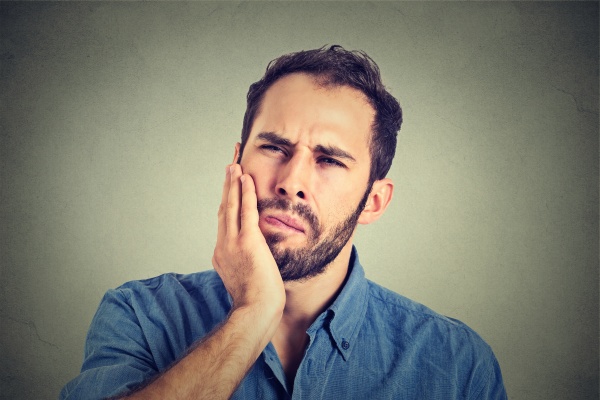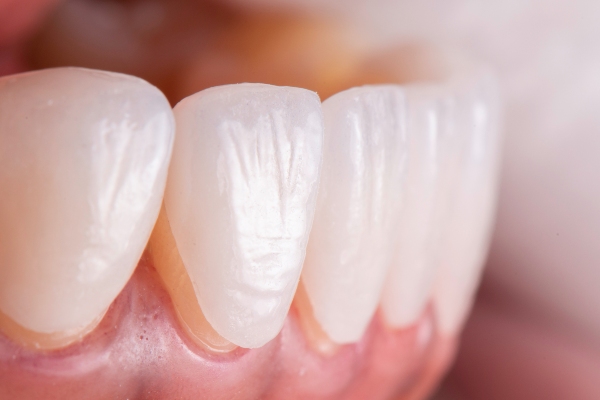Common Dental Causes of Orofacial Pain

refers to any pain that is felt in the mouth, jaws or face. This common condition affects many adult dental patients and can be a frustrating issue as the source usually varies from person to person. Almost every case of orofacial pain originates in the mouth and is caused by dental issues.
Orofacial pain can occur anywhere above the neck, including the front of the ears, behind the ears, below the eye line and within the oral cavity. Some conditions that cause orofacial pain can extend all the way up to the temples on either side of the head.
What is causing my orofacial pain?
There is no one reason why you may be experiencing orofacial pain. In fact, it could be a combination of a few issues that stem from the oral cavity. The following is a list of potential causes of orofacial pain.
Pulpitis
This infection of the pulp (the tissue deep inside tooth roots) can cause a radiating pain that starts in the jaw and reaches all the way up to the temples. It may be a sudden, sharp pain or a dull, persistent pain that lasts for days. This pain will usually get worse and worse as the infection spreads. However, once the infection has reached the nerves, the patient may feel no pain at all.
TMD
Temporomandibular joint dysfunction, or TMD, is a condition that is characterized by pain in the jaw joint hinges. TMD is often caused by malocclusion, otherwise known as a bad bite. When the teeth do not fit properly together, the mouth muscles and temporomandibular joints have to work extra hard to help the teeth to do their job.
Dental abscess
Orofacial pain caused by a dental abscess is usually sharp and can be caused by an event such as biting down on the affected tooth. This pain is often felt in the cheek and behind the ear on the side where the abscess resides.
Tooth decay
Even a simple cavity can cause a toothache that translates into orofacial pain. Thankfully, having that cavity diagnosed, cleaned and filled will rid the patient of any pain fairly quickly.
Gum disease
This common condition affects many adults. Gum disease is caused by an infection of the gum tissue, usually from periods of poor oral health. Those with diabetes may experience more frequent gum disease. If gum disease is left untreated, it can devolve into periodontal disease. This destructive infection can irreversibly damage gum tissue and even the jawbone. Periodontal disease can cause pulsating pain that usually originates at the front of the face.
Bruxism
Dental damage and TMJ fatigue from teeth grinding cause many instances of orofacial pain. Adult patients who tend to grind and clench their teeth usually do so unconsciously at night while sleeping. However, one of the symptoms of bruxism is a dull headache at the temples and behind the ears during the day.
Cure your orofacial pain
No matter the source of the pain, we can help you get to the bottom of what is causing your orofacial pain. Call our office today to set up an appointment if you are experiencing any unpleasant dental or facial symptoms.
Request an appointment here: https://www.smilebeautification.com or call Precision Smiles. at (201) 204-1355 for an appointment in our Hackensack office.
Check out what others are saying about our dental services on Yelp: TMJ Dentist in Hackensack, NJ.
Recent Posts
Your TMJ or temporomandibular joint attaches your lower jaw to your skull. A problem with your TMJ can make dental functions difficult. Understanding the treatments for this ailment can help you prepare for your appointment. Here are the details on how your dentist can treat your TMJ.The dentist will talk to the patient about the…
Do you suffer from a TMJ disorder, and are you looking for a TMJ dentist? Individuals can start by seeing their primary general dentist, who has training on the temporomandibular joint and how it affects one's dental health, including the jaw and entire skull.In order to utilize the services of a TMJ dentist, it is…
A TMJ dentist is a dental professional that focuses on treating conditions that negatively affect the structures of the temporomandibular joint. Continue reading to find out more about TMJ disorder and what the dentist does.Outlined below are five questions to ask a TMJ dentist. In addition to these common questions, the answers are also provided,…
TMJ, or the temporomandibular joint, can be a painful disorder that makes simple tasks like chewing uncomfortable and unpleasant. While it can be difficult to determine why a person is experiencing pain in this joint, there are ways that they can be managed, often without invasive procedures. Pain is often experienced in the jaw or…


